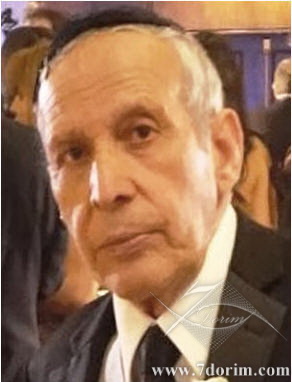
Musa Tajian’s life journey reflects unwavering dedication to faith and education. Beyond teaching, he played a pivotal role in leading prayers, overseeing kosher practices, and fostering community growth both in Iran and the US, leaving a lasting legacy.
Birth and Family
Born in 1937 into a devout Jewish family in Yazd, Musa Tajian had a merchant father who was also religious and righteous, Rabbi Shimon Ben Mordechai. Like his father, his mother, Rahel, was virtuous and pious.
Education and Development
Religious education
Musa’s pious family would be a breeding ground for him to start learn religious teachings from childhood from his father. Later, he studied the Torah and religious sciences under the guidance of the late Mullah Khananiya, a respected spiritual leader in Yazd.
Official education
Musa completed his primary education at Alliance (Ettehad) School in Yazd and continued his secondary studies at Iranshahr High School, obtaining a mathematics diploma in 1956.
He later pursued religious education at the Ozar HaTorah seminary in Shiraz, founded by the late Rav Yitzhak Meir Levi. During two years of study, he completed courses in Jewish law and traditions under prominent scholars like Yehoshua Nathan Eli, the late Rav Ben Haim (the elder uncle of Rabbi Eliyahu Ben Haim), and other instructors visiting from Israel Yeshivah. He graduated within two years.
Semicha (religious slaughter certification)
Encouraged by Yehoshua Nathan Eli and Rav Ben Haim, Musa pursued both academic studies and the practice of kosher slaughter (Shechita) under Rav Ben Haim’s guidance. Through dedicated training, he earned his Semicha, a certification in kosher slaughter, further deepening his religious expertise.
Machon HaRav Gold Yeshiva
In 1958, Musa was sent to the Holy Land by the Ozar HaTorah Institute to continue his studies at the Machon HaRav Gold Yeshiva in Jerusalem, considered one of the best, where he gained valuable insights from esteemed professors.
Life and Career in Iran
Shochet in Urmia
After returning to Iran, Musa officially joined the Ozar HaTorah Institute. His first assignment, suggested by Rav Levy, was to teach religious studies in Rezaieh, a Jewish town in northeastern Iran that lacked a Shochet, a kosher slaughterer. His teaching career began at Urmia’s Ganj-e Danesh school, where he taught Hebrew and also performed kosher slaughter (Shechita) for the Jewish community.
After two years, he returned to Tehran and was transferred to Ettehad-e Now School by Ozer HaTorah as a religious studies teacher.
Teacher in Tehran
At Ettehad-e Now School, Musa actively engaged in teaching, preparing young students under 10 to read the Torah, demonstrated in the school’s own synagogue. For this achievement, he received awards from the late Habibollah Cohen, the head of the cultural center. He was also promoted as the Chief Executive Officer of this cultural institution.
Following this promotion, Musa was appointed to teach at Aghajan Abrishami School on Elizabeth Boulevard. His dedication earned him recognition from synagogue leaders like Aghajan Abrishami and Abdullah Nathan Eli, who asked him to create a Friday class to train students who wanted to read Torah in Shabbat services. The became popular among parents, with many students showing impressive progress.
Musa returned to Yazd in 1963.
Leadership in Yazd
Over the next ten years, Musa revolutionized Hebrew education in Yazd. He organized evening classes for adults to become prayer leaders (Shaliach Tzibbur) in synagogues. He also taught Hebrew in evening classes at the Chalutz School and established classes for learning bird slaughter rituals (Shechita) on Fridays. Musa oversaw the kosher slaughter (Shechita) of birds and livestock, especially when Rabbi Yosef Hamadani Cohen was away from Yazd. His efforts brought significant improvements to the education system for Yazd’s Jewish youth. He also facilitated the Aliyah (emigration to the Holy Land) of Yazd’s Jewish community.
Marriage
In 1969, Musa married Ashraf, from the Cohen Qadosh family, which was a family of educators in Yazd, acting as headmasters of Yazd’s Alliance School. Together, they had three daughters and one son.
Leadership in Tehran
In 1973, Musa relocated to Tehran and continued teaching Hebrew and religious sciences at Ettehad Jaleh School for one year and Roohi Shad School (Darvazeh Dowlat) for three years. From 1978 onwards, he taught at the Suleiman Haim School in the Bagh-e Saba district until his retirement.
In 1975 (1354 [solar calendar]), Musa was formally invited by the Seyyed Khandan Synagogue board to serve as a Shaliach Tzibbur (prayer leader) on Shabbat and special holy days like Rosh Hashanah, Yom Kippur, and Mo’adim (Jewish festivals). He accepted the role and faithfully led prayers, Torah readings, and religious teachings for 26 years.
Further contributions
In addition to teaching, Musa took on other responsibilities too, as advised by Rabbi Oriel Davidi, the leader of Iran’s Jewish community. He oversaw the kosher slaughter of four-legged animals donated to nursing homes. For a while, he led the weekly Haftarah interpretation at the Ruhi Shad Synagogue, always after a speech by Rabbi Uriel Davidi and with the Rabbi present. He translated and interpreted the Parashah of the Torah and the weekly Haftarah from Hebrew into Persian, distributing them in synagogues.
Emigration to the US
Shaliach Tzibbur
In 2006, Musa and his wife emigrated to Great Neck, New York, to reunite with their children. Shortly after, he was invited by the Derech Emet Synagogue to serve as a Torah reader and Shaliach Tzibbur, a role he embraced with renewed dedication.
Kashrut (ritual suitability) supervision and education
A few months later, Musa was introduced to the Kashrus Institution Vaad Harabonim in Queens by the Iranian Jewish community. After passing the required exams, he was employed at the institute as a kosher supervisor (Mashgiach) at several restaurants in Great Neck, Queens, and Manhattan.
While there, he continued his religious studies by attending classes on Talmud and other topics taught by rabbis in Great Neck, further enhancing his knowledge.
Conclusion
Musa Tajian, one of the earliest graduates of Ozar HaTorah, spent more than forty years serving the Jewish community of Iran. He made his mark teaching in schools like Ettehad (Alliance), Ganj-e Danesh, Abrishami, and Soleiman Haim, and in synagogues throughout Tehran and beyond. Recognized for his excellence as a teacher of Hebrew and Jewish religious studies, he dedicated much of his life to shaping and mentoring the younger generation. His legacy as an impactful educator stands as a cornerstone of his cultural contributions, but his efforts to contribute to the community in every way possible also shows his dedication to the Jewish community.


 فارسی
فارسی